Jul 2021 2nd Edition
Jul 2021 2nd Edition vuyelwan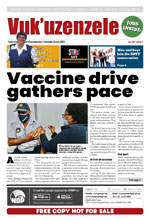
Translations
Afrikaans
isiNdebele
isiXhosa
isiZulu
Sepedi
Sesotho
Setswana
Siswati
Tshivenda
Xitsonga
AmaRoom takes township rentals to a new level
AmaRoom takes township rentals to a new level UrsulaNew free-to-use app connects potential tenants to backroom landlords
Entrepreneurs Israel Mashele (32) and Oskido Mathe (32) have developed an app called AmaRoom to help tenants find room rentals in townships. 
“It is a quick, safe and easy way to find your perfect room in a township,” says Mashele.
He came up with the idea when he realised that many people in Tembia, Gauteng were struggling to find rental accommodation.
“I worked with an agent to help me find tenants for the rooms at my parental home. I found it fascinating that he advertised his rooms on WhatsApp.
“When I asked him why, he said people are using mobile technology and apps are an easy way to spread word-of-mouth advertising. This sparked the idea,” Mashele explains.
It took over two years for Mashele to perfect the app. He explains that a landlord simply uploads their personal details, an image of the property, where it’s located and how much it costs.
An administrator then conducts security checks and approves or denies the post. Tenants can then search for a property to rent.
The app covers 263 townships nationally.
“We have enabled landlords to add areas which may not have been covered, but an administrator also has to validate and approve these areas. Our aim is to grow our coverage in Gauteng, particularly in Alexandra, Soweto and Tembisa.”
The app is free to use. “The market is tough and asking uMama or uBaba to pay a subscription fee would not suffice. Instead, we are looking at potential advertisers, such as local moving companies, DStv installers and other service suppliers one uses when you move.”
South Africa’s informal rental market is said to make up 18% of the country’s rental market, translating to thousands of rands each year.
The app is aligned with government’s research into a plan to upgrade township dwellers’ properties, for backyard rentals, by creating a rent-sharing agreement between the main landlord and funder.
The Gauteng MEC for Human Settlements, Urban Planning, Cooperative Governance and Traditional Affairs, Lebogang Maile, recently said: “Most townships and informal settlements have a thriving backyard rental market that provides affordable accommodation to people who can’t afford rental housing provided by the big players in the social housing market.”
The app is available to download from the Google Play Store and Apple iStore.
Bees make life sweeter at Moja Gabedi
Bees make life sweeter at Moja Gabedi BathandwaA University of Pretoria (UP) community engagement project is training students and community members to become beekeepers in Hatfield, Gauteng.
Six people are being trained to care for beehives that were discovered at Moja Gabedi, a UP community engagement project which was an unofficial rubbish dump for about 100 years.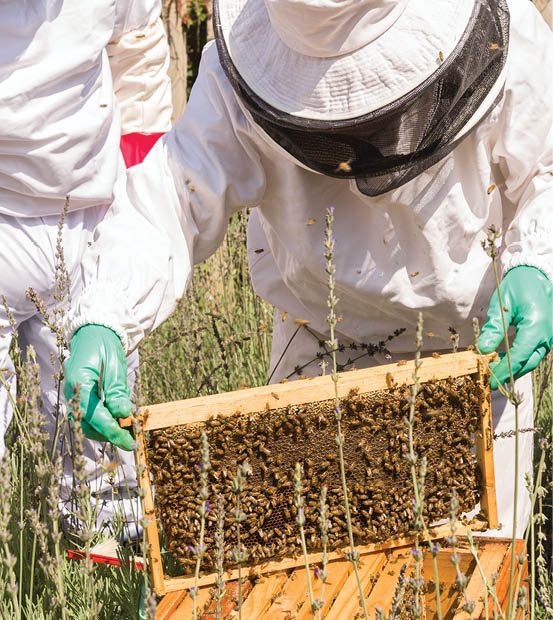
Moja Gabedi was an unsightly, empty lot in Festival Street, not far from the university’s Hatfield Campus.
The university’s Community Engagement Unit transformed the dumpsite into a shelter for the homeless, with lush gardens, vegetables, trees and flowing canals.
“When we started clearing the site, we discovered bees deep underground in a corner of the plot. When the site was developed further, professional beekeepers were called in to relocate the bees into a hive,” says Gernia van Niekerk, Moja Gabedi’s Community Engagement Manager.
While there was initially only one hive, three more have been added since June 2020.
This presented an opportunity to train UP students and community members to care for the hives, and Mike Lang from Urban Bees offered to conduct a beekeeping course.
Thanks to sponsors of protective gear and tools for beekeeping, the course was offered for free to two UP students, three community members and two urban farmers.
They all attended an introductory class and were taught about bees, how a bee colony works, how to work with beekeeping equipment and safety practices.
UP student Daddy Kgonothi says at first, he wasn’t really interested in bees.
“When I learnt more, I understood that one should make the garden user-friendly for bees. If you know how to approach bees correctly, you’ll come to see that they are fascinating insects, he says.
Community member Reckson Tshehla, who also attended the course, is keen to expand his knowledge about bees.
"It was the first time I saw a queen bee. I never thought I would get the opportunity to learn about bees.
"Moja Gabedi changed me. I experienced many things for the first time. Everything is so well organised," he says.
Follow up training and practical classes will be conducted on colony management, managing diseases, honey production and processing, handling beeswax and pollen trapping. Those who complete the training will work with the site’s bees and get practical experience with Urban Bees.
Former miners hit gold with chickens
Former miners hit gold with chickens BathandwaFive former miners started a legacy agriculture project that not only aims to put food on tables, but to also stop their grandchildren from becoming mine labourers.
The men started the Ubumbano Secondary Cooperative in Gobothi village in Ngcobo, Eastern Cape, after falling on hard times when they left their jobs.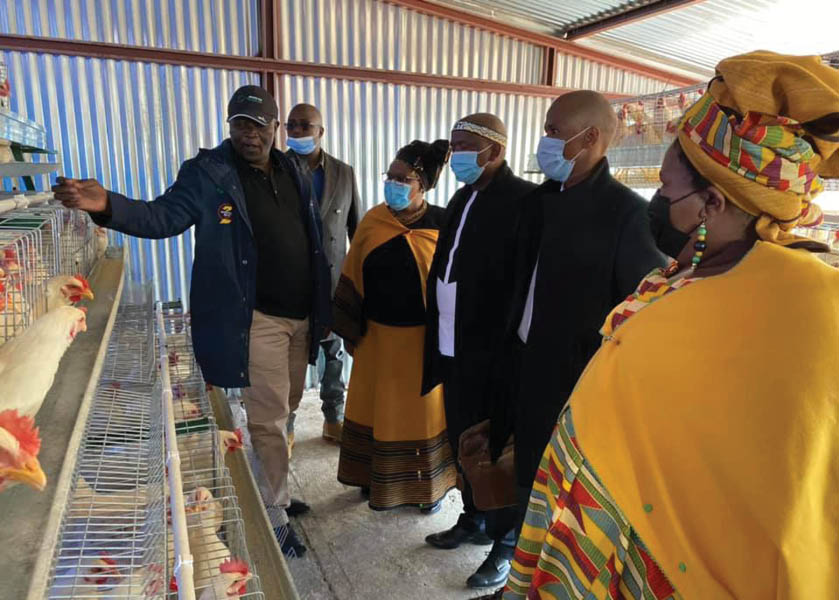
“We were faced with a lot of poverty in our families and we saw that the best way of ending this was to enter the agriculture sector,” says the cooperative’s Chairperson, Mzimasi Sotyatho (71).
“We have over 4 000 chickens that lay anything between 1 200 and 1 800 eggs a day. We sell the eggs to a Spar in Ngcobo and to schools and locals,” he adds.
The cooperative, which was registered in 2019, received funding of R5 million from the Mineworkers Development Agency and Rand Mutual Assurance. It now has 12 permanent employees.
The funding was used to drill a borehole, construct a cold room and purchase a septic tank and a 20kVA backup generator.
The Eastern Cape Department of Rural Development and Agrarian Reform is helping the cooperative with funding to grow, so that it can achieve wholesale sales.
“If this [cooperative] is sustained, generations to come will benefit from it. In the past, people had to leave their homes and go to urban areas to find work. They ended up living in shacks there,” says Eastern Cape MEC for Rural Development and Agrarian Reform Nonkqubela Pieters.
A member of the cooperative, Bulelwa Mbutuma (53), says it has provided jobs for the miners' children. He explains that the cooperative primarily hires the former miners’ children, who will eventually inherit their parent’s position in it. This way, they also leave a legacy for their children.
The Ubumbano Secondary Cooperative also helps smaller cooperatives that farm vegetables. Sotyatho says it assists vegetable farmers to access tractors and agricultural implements, such as ploughs and planters.
“We also buy fertilisers and seeds, which we sell to the primary cooperatives. We also assist these farmers by teaching them how to farm the vegetables and the best times to plant them,"
he adds.
For more information on the assistance offered by the Eastern Cape Department of Rural Development and Agrarian Reform, contact the department at 040 602 5006.
Furniture Portal to build the sector
Furniture Portal to build the sector UrsulaSouth African furniture manufacturers now have an online portal on which they can showcase their products to consumers. 
Launched by Proudly South African, in partnership with the Department of Trade, Industry and Competition (dtic), the Furniture Portal aims to assist the sector, which has suffered a decline in recent years, and has the capacity for massive job creation.
“The value of the furniture industry in South Africa is enormous, and we want to tap into the procurement of furniture especially by corporate South Africa, and this portal will be a place to which we can drive demand,” says Chief Executive Officer of Proudly South African Eustace Mashimbye.
The portal will be a valuable resource for any buyer of furniture, from private consumers to large corporates and the public sector.
Mashimbye says local furniture manufacturers have the potential to grow, due to the Preferential Procurement Policy Framework Act, which states that government departments must consider South African manufacturers when making purchases.
When buying office furniture, 85% has to be produced locally and 100% of any school furniture has to be from a local manufacturer. For bed bases and mattresses used in places like hospitals, 90% have to be locally manufactured.
“We look forward to seeing the content of the portal expand now that it has been launched. We encourage anyone who procures furniture to refer to the portal before looking anywhere else,” says Mashimbye.
The Director of Resource Based Industries at the dtic, Tafadzwa Nyanzunda, says the portal will help Proudly South African reach the objectives of the South African Furniture Industry Masterplan, which was adopted earlier this year.
“We are delighted that this portal will provide solutions to the companies that do not only have limited resources in terms of marketing their products, but will also empower them on ecommerce and expertise.
“This platform will certainly increase the visibility of local furniture brands and will deliver invaluable data regarding consumer shopping patterns,” he says.
To register on the Furniture Portal, visit www.proudlysa.co.za/covid_19/furniture/furniture.php
GBV support for the deaf community
GBV support for the deaf community BathandwaGender-based violence (GBV) survivors in the deaf community often face difficulties when trying to access help due to the language barrier they encounter.
Many frontline workers who aid GBV survivors do not understand South African Sign Language (SASL) – the language used by the deaf community.
To address this challenge, the NEEMA Foundation for the Deaf is working with the National Development Agency (NDA).
Foundation Chairperson Cebisile Ndebele says in many cases, members of the deaf community are not adequately assisted at police stations.
“We have been engaging with the South African Police Service (SAPS) in this regard. Some of the stations are starting to integrate SASL interpreters and some police officers attend SASL classes. However, we are still at the early stages of this initiative.”
The foundation’s efforts are in line with the NDA’s vision of strengthening families and preventing social crime. 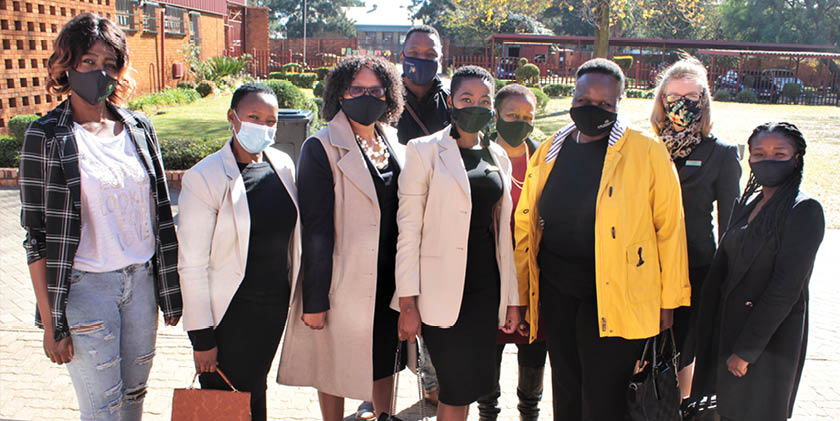
“We respond to challenges faced by the deaf community through Family Support and Gender-based Violence Workshops, which are funded by the NDA,” explains Ndebele.
Raising awareness
Ndebele says a lot more needs to be done to assist this vulnerable group.
“Most deaf children are born to hearing parents. In some instances, communication in the home becomes a huge issue when children start having normal teenage behavioural issues. This causes tension at home and is a great source of teenage depression,” she says.
The foundation brings social workers, counsellors, SAPS, National Prosecuting Authority, Department of Basic Education and other stakeholders together to talk to parents and deaf learners about issues affecting them.
They also open cases for investigation and get councillors to intervene, where necessary.
The foundation targets women, youth and children because they are generally vulnerable, especially if they are deaf or hard-of-hearing.
“They are faced with enormous challenges, including attaining an education, starting a business or obtaining employment. This prevents their economic and social independence,” says Ndebele.
For more information on the GBV workshops, email info@foundationneema.org or send a WhatsApp to 065 513 9731.
Healthcare boost for Rockdale
Healthcare boost for Rockdale BathandwaMpumalanga’s Rockdale community no longer has to travel to Middelburg to access healthcare services, thanks to the opening of a state-of-the-art, 24-hour community healthcare centre.
The new healthcare centre will also ease congestion at Middleburg Hospital and other healthcare facilities in the area.
The centre was donated to Steve Tshwete Local Municipality by Seriti Power.
The company built the healthcare centre at a cost of over R34 million. It forms part of the Seriti Power’s social and labour plan commitments to contribute towards local economic development in the area.
The healthcare centre provides acute, chronic, maternal and child health services. It also has a fully equipped dental department and two living quarters to accommodate staff so that they can offer a 24-hour service to the community.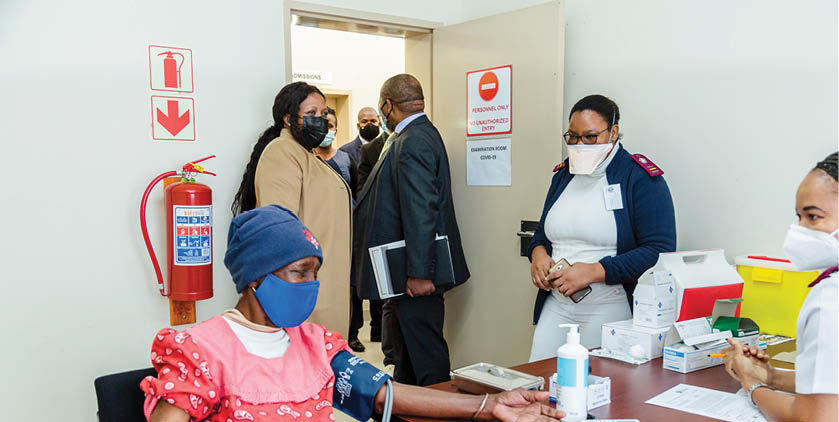
“We are committed to supporting our neighbouring communities and working collaboratively to enhance government’s delivery of primary healthcare and community health and wellness,” said Mike Teke, Seriti Power’s Chief Executive Officer.
Minister of Mineral Resources and Energy Gwede Mantashe applauded Seriti Power for giving back to people and urged other mining companies to also invest in projects that improve lives.
“Infrastructure development is the way to go to further enhance service delivery for the people of this country,” he said.
Seriti Power’s decision to invest in the construction of the clinic was taken after extensive participation in Steve Tshwete Local Municipality’s Integrated Development Plan process, which ensures that projects sponsored by mining companies are linked to government’s development priorities.
“We recognise that local communities face many challenges and we undertake regular, open and honest conversations to better understand what our stakeholders need and how we can support them as a local champion in the area,” said Teke.
The construction of the project created 80 jobs for local community members, more than 50% of which are youth. The company also used 100% black, women-owned, local project management and construction companies to manage the delivery and execution of the project.
The Premier of Mpumalanga, Refilwe Mtshweni-Tsipane, said the healthcare centre is a significant resource for the province. “We plead with Rockdale community members to safeguard the facility,” she added.
Luvuyo Ndiki takes his business to new dimensions
Luvuyo Ndiki takes his business to new dimensions UrsulaMotivation and determination ensured that a young entrepreneur achieved success in his career of choice. 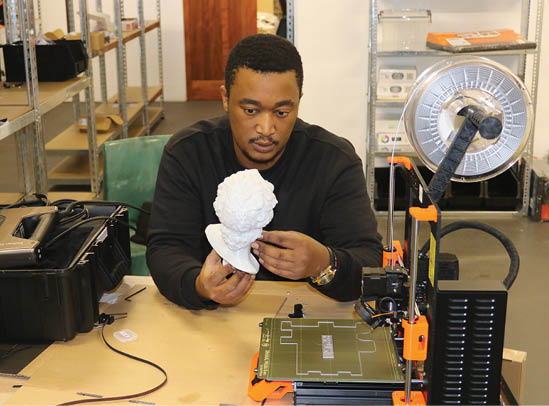
Luvuyo Ndiki is proof that setbacks in life should not stand in the way of your dreams.
Ndiki (30), from Butterworth in the Eastern Cape, applied for a course in interior design in 2010, but was rejected because he didn’t meet the requirements.
He was advised to consider studying design foundation instead, which he did for a year at the Cape Peninsula University of Technology.
“The course included all the disciplines of design, including fashion, interior design, surface design and three-dimensional (3D) design,” says Ndiki.
During his studies, Ndiki discovered his passion for 3D design and 3D printing technology.
“Unfortunately, I couldn’t complete the course due to financial constraints,” he adds.
As he was eager to get a qualification, Ndiki enrolled for and completed a qualification in public relations (PR) management at the same institution, but still continued to teach himself more about 3D design and printing.
In 2014, while still studying, he established his business, Red Cup Village, which specialises in manufacturing and selling 3D printing prototyping services.
After graduating, Ndiki worked for a PR agency as a media coordinator and account manager. He then decided to focus on his business.
“Our mission is to create innovative concepts and premium products. We manufacture and sell products on our ecommerce platform, while also customising and personalising products per customers’ requests and needs using 3D printers,” he says.
Ndiki explains that a 3D printer makes products by melting plastic and layering it into a 3D shape, the same way cake icing is done.
“You can make and sell any plastic product you dream of. We are using this technology to make plastic products faster than traditional manufacturing, while creating new technology jobs.”
Through this type of technology, the company is able to manufacture a new product within 24 hours, while traditional manufacturing takes from six months to three years.
“Our products cost less because they are 100% locally manufactured,” he says.
The business received funding of R50 000 from the National Youth Development Agency (NYDA) to buy equipment, including a 3D printer and laptop, and has created five jobs and two learnerships to date.
For more information about NYDA funding, contact 087 158 6345 or visit www.nyda.gov.za
Meet COVID-19 heroine Monica Adams
Meet COVID-19 heroine Monica Adams vuyelwanDespite almost dying after contracting the Coronavirus Disease, a brave and inspiring nurse continues to fight the pandemic on the frontlines.
South Africa has many heroes and heroines that have gone above and beyond the call of duty during the Coronavirus Disease (COVID-19) pandemic. One of these inspirational people, who is admired by many, is Tygerberg Hospital’s enrolled nurse Monica Adams (60).
Even though she is at high risk of serious complications from COVID-19, as she suffers from high blood pressure and weak lungs, Adams continues to put herself in the virus’ firing line to help her patients.
Her journey during the pandemic has been far from easy, especially as she has already contracted COVID-19 and was extremely lucky to survive.
“I was diagnosed with COVID-19, hospitalised and ventilated for four weeks. I then underwent rehabilitation for two weeks, as I could not walk,” says Adams. 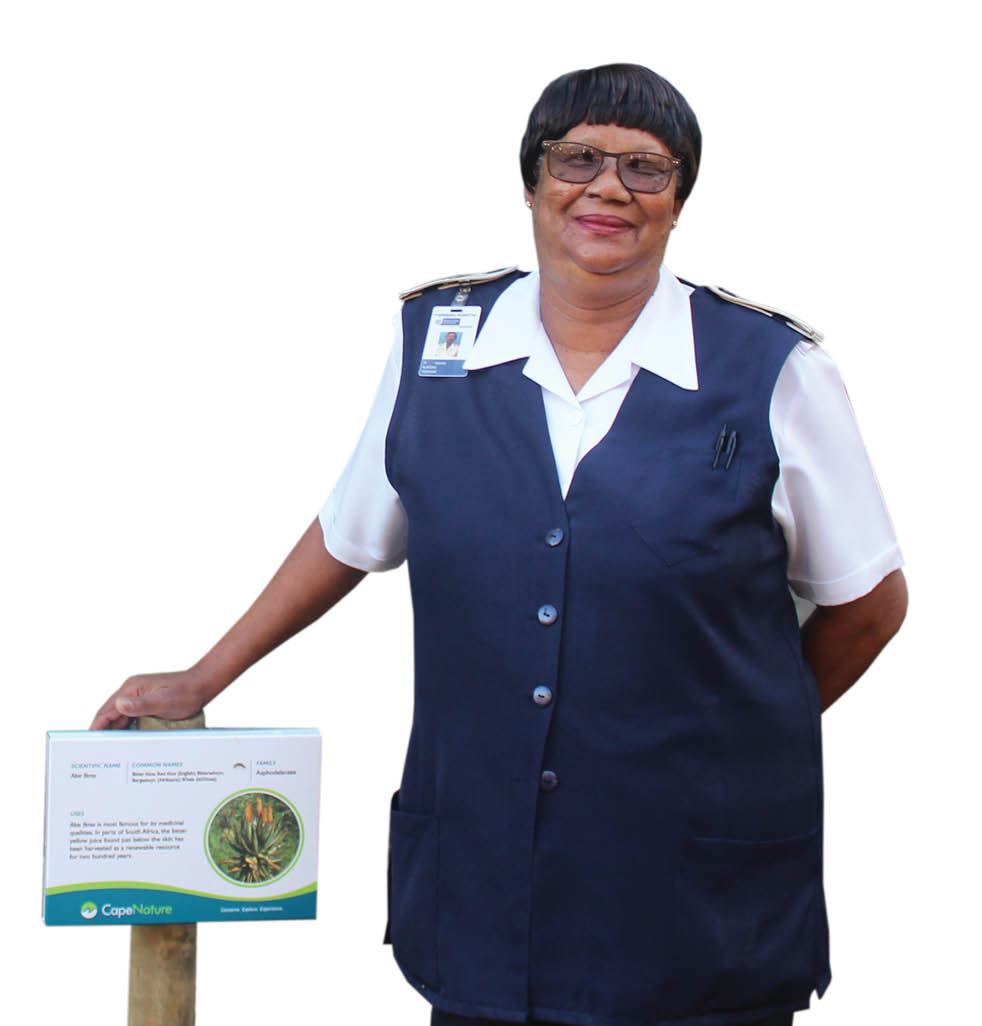
“I have family members with two small children at home, whom I care for. But, because of my constant awareness of this virus, my family members were not infected by me. They were, however, affected by my hospitalisation as they didn’t know if I would come back home,” she adds.
Love for the job
Instead of being fearful of going back to work after recovering from COVID-19, Adams says she felt excited to return after such a long time away.
“I was and still am cautious when working with patients who have COVID-19 symptoms. I continue to do my job because I love my work. I do everything with love, to the best of my ability,” she says.
Born in Cradock, in the Eastern Cape, Adams now lives in Delft on the outskirts of Cape Town. She says it’s an honour for her to motivate the hospital’s staff members who feel demotivated or have a low morale as a result of the pandemic.
“I am living proof that we can survive this virus,” she says.
A nurse for the past 35 years, Adams says she loves to help people.
“It was always my childhood passion. I love to assist people in need. I love working daily with patients, giving them advice and encouraging them.
“It gives me great pleasure and warms my heart to nurse a patient who cannot do it for themselves.”
Experience on the frontline
Adams says her experience on the frontline since COVID-19 hit South Africa in March last year has been very overwhelming, especially in the beginning.
“We did not know anything about this virus. We could not see or smell it, but it was very real. We were terrified, but kept the faith and had to move forward as a team,” says Adams.
She has had to be cautious at work every day because want to protect her family at home.
“When cases were rising in the beginning it scared me, but as a nurse, I had to pull through and pray that I would be okay at the end of the day.”
Adams has learnt many lessons during the pandemic which, she says, has drawn her closer to her patients and their needs.
“I have learnt to have more patience, to live in the moment and to make the best of each moment. I have also learnt to be more thankful. We need to appreciate each another.”
Play your part
Her message to South Africans during the third wave of the virus is to be very careful.
“If you can stay at home, please do. Always wear a mask when going out and adhere to social distancing.
“Wash or sanitise your hands frequently, stay away from crowds and avoid social gatherings,” says Adams.
She adds that health workers are putting their lives at risk daily to care for their fellow South Africans.
“We care about you, that’s why we are at work every day and risk our lives for you. Take care of us by adhering to the COVID-19 precautionary measures,” says Adams.
She has already received her COVID- 19 vaccine and is looking forward to the majority of the population also receiving their doses as government’s vaccine programme progresses.
“I urge everyone to go and get vaccinated as soon as they can, to protect yourself against this virus and prevent being hospitalised,” she says.
Men and boys join the GBVF conversation
Men and boys join the GBVF conversation BathandwaA KwaZulu-Natal non-profit organisation brought 200 boys and young men together to talk about gender-based violence and femicide and other social ills.
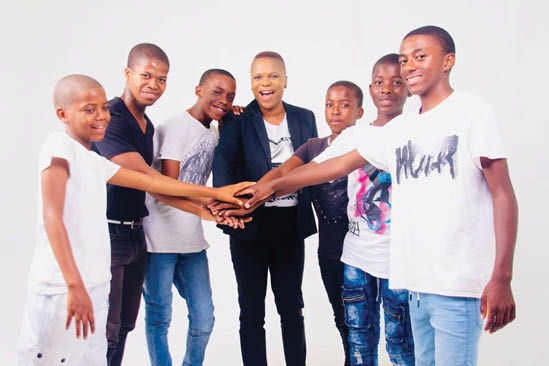 Thanda Mbeje, who started the foundation, said that while there has been great emphasis on preventative gender-based violence and femicide (GBVF) measures for girls and women, little has been done to include boys and men in the conversation.
Thanda Mbeje, who started the foundation, said that while there has been great emphasis on preventative gender-based violence and femicide (GBVF) measures for girls and women, little has been done to include boys and men in the conversation.
She believes that GBVF can be largely attributed to how children are raised, emphasising that no one is born an abuser.
Five speakers addressed the seminar, which was held under tight Coronavirus Disease restrictions.
Speaker Phakamile Mazibuko told attendees that it is important for them to acknowledge their emotions so that they can address what they are dealing with.
“You can train your mind to be stronger than your emotions, even on dark days. Giving up is not an option. Don’t be discouraged, instead, be resilient and continue to work hard.”
Prince Thokozani Zulu from the Zulu royal household talked to the boys about a man’s role at home and in society.
He urged them to live exemplary lives that would bring pride to themselves and their families.
“We want you to be responsible and protective men,” he said.
One of the attendees, Aphiwe Mkhize (17), said growing up without a father meant there was no one around to teach him what he learnt at the seminar.
“I want to continue attending this seminar until I am a mature man and can return to mentor other boys. If we had people teaching us about being responsible men, we would not do wrong things.”
Bongumusa Gwala (16) said the seminar inspired him to teach his peers what he learnt, as it will also benefit them.
For more information about the Thanda Mbeje Foundation, call 073 253 9535.
Nosihle and Phumelele are all about natural beauty
Nosihle and Phumelele are all about natural beauty BathandwaFrom launching their own African natural hair treatment products, to opening a salon, two Durban women are driven by a passion to help African women embrace their natural beauty.
Nosihle Dlamini and Phumelele Khumalo, the founders of Get2Natural, created their own hair treatment product after trying many that didn’t work for them.
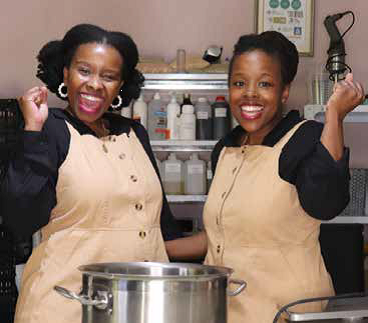 “Black African women have a desire to grow long, healthy hair. However, many women struggle to do so,” says Dlamini.
“Black African women have a desire to grow long, healthy hair. However, many women struggle to do so,” says Dlamini.
She adds that many women then turn to weaves and wigs, which damage the scalp and cause a receding hairline.
“Due to scalp damage, they wear more weaves and wigs to cover it up. This makes it worse and an endless cycle of damage is created.”
Get2Natural produces oils specifically for an individual’s low, normal or high porosity hair type (a measure of how well a person’s hair absorbs moisture).
“We understand that ‘one size does not fit all’ when it comes to hair. Our hair butter consists of only aromatherapy oils and natural butters, such as shea butter which is considered gold amongst naturals,” says Dlamini.
All of the raw materials they use come from local suppliers. Once received, they are carefully mixed and aseptic techniques are used to ensure the products remain contamination free.
Due to increasing demand, the pair opened their own salon. However, due to the Coronavirus lockdown, they were forced to close.
“We were disappointed, but not defeated. We went back to the drawing board and strategised how to make products available through contactless streams and increase our online presence,” says Khumalo.
Determined to recover from the loss of closing the salon, they improved and rebranded their products. They also introduced new products into their range.
“Our formulations are now backed by science and the packaging and labels are on par with big brands in the market,” says Khumalo.
They plan to reopen their salon when they can.
To view a tutorial on how to treat African hair, visit the YouTube channel: Get2Natural.
Nursing students join the COVID-19 fight
Nursing students join the COVID-19 fight BathandwaFinal-year nursing students have been trained to vaccinate the public against COVID-19. 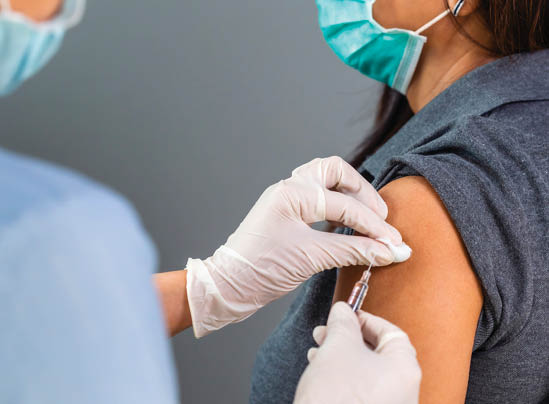
The Western Cape Provincial Government has increased its efforts to roll-out the Coronavirus Disease (COVID-19) vaccination programme by training final-year nursing students as vaccinators.
A partnership between the provincial government and the University of the Western Cape has already resulted in 267 final-year nursing students receiving the necessary training.
According to Western Cape Premier Alan Winde, the students will assist with the vaccination programme during their mid-year break, when they undertake their clinical placement.
“They are set to play a major role in our vaccination campaign,” he adds.
The students, who were trained by the Western Cape Department of Health, will take up positions on the frontline.
“This will provide a welcome boost to our [vaccination] programme as we scale up in the weeks ahead. As more vaccines arrive, more vaccination sites will open and more support will be needed,” says Premier Winde.
The students were split into two groups. The first cohort of 134 vaccinators took up their positions on 17 June, while the rest will start on 19 July.
Online and practical training
The students completed vaccination competency training in their third year and are therefore well prepared to support the Department of Health in its vaccination programme, says the Premier.
The students’ training for the vaccination programme took place online, via the university’s zero-rated IKamva learning site.
The content was developed by the Western Cape Department of Health’s People Development Centre and is aligned with the National Department of Health’s vaccine training. It included:
- A basic overview of COVID-19.
- An outline of the various available vaccines.
- Training on monitoring patients for adverse side effects.
One of the trainees, Donovan Du Plooy, says it is a privilege to be part of the group.
“It is an urgent and equally important part of the country’s response to the management of the COVID-19 pandemic. This will ensure that we get our communities vaccinated, which is important to acquire herd immunity,” he says.
They have eight months to go before they start their placements as professional, registered nurses.
“During their placements, they will work full-time at vaccination sites in the Cape Winelands, including Stellenbosch, Paarl and Wellington. They will also be placed in Khayelitsha East and Northern Tygerberg in the Cape Metro,” says Premier Winde.
Oarabile Mashigo stitches up a brighter future
Oarabile Mashigo stitches up a brighter future UrsulaOarabile Mashigo’s (22) warm and contemporary handwoven blanket business is keeping struggling Pretoria West community members warm and teaching unemployed youth skills to earn a living and stay away from crime. 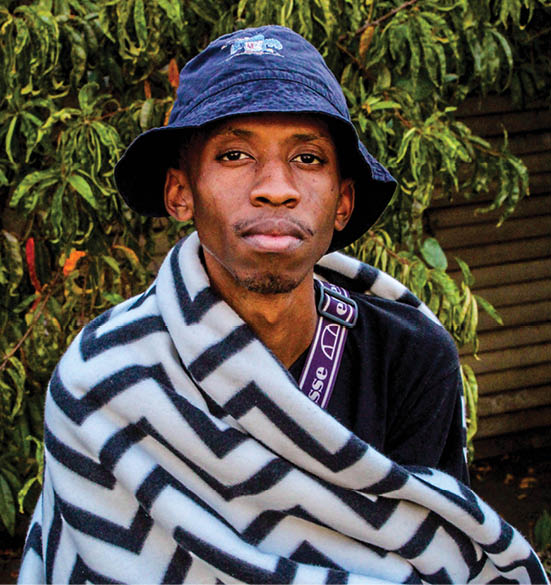
Mashigo planned to continue his studies after obtaining his BA Law degree, but had to drop out because of a lack of funds.
However, he was not discouraged and soon another opportunity came his way. The house guardian at his university residence, David Raats, introduced Mashigo to his wife Nicolette, who taught him how to sew and make fleece blankets and scarfs.
Wanting to raise money to hopefully be able to fund his own studies in 2022, Mashigo decided to hone his new craft.
“Nicolette taught me how to monetise my blankets and scarfs. This is how my business, Cozii Lifestyle, was born.”
Needing capital to start his business, Mashigo started doing bicycle grocery deliveries in his neighbourhood.
“I charged R10 per trip to go to the mall and get groceries. With the money I made and donations from David and friends, I was able to start my business.”
At first, the business was making between two and three blankets a week, but this has increased to five.
Empowering others
While building his business, Mashigo realised that there are many economic and social issues affecting his community, specifically with regard to unemployment and drug abuse.
Wanting to help these stru-ggling community members, Mashigo decided to teach them how to make blankets and scarfs.
“I work with three young people who assist with sewing and knitting, but I hope to train and employ more people to fight unemployment in my community.
“With the skills they are learning, they can make an income and don’t have to resort to a life of crime or substance abuse,” says Mashigo.
He believes the youth sho-uld not wait for others to improve their lives or communities.
“Each of us needs to stand up and become change activators in our communities. It doesn’t matter how small your actions are, the most important thing is to get started,” he says.
For more information about Mashigo and his blankets, follow him on Instagram @coziilifestyle.
Ouma Katrina on a mission to preserve N|uu
Ouma Katrina on a mission to preserve N|uu UrsulaA fluent speaker of N|uu has written a children’s book in her native language, which is regarded as one of the oldest and ‘critically endangered’ languages in the world. 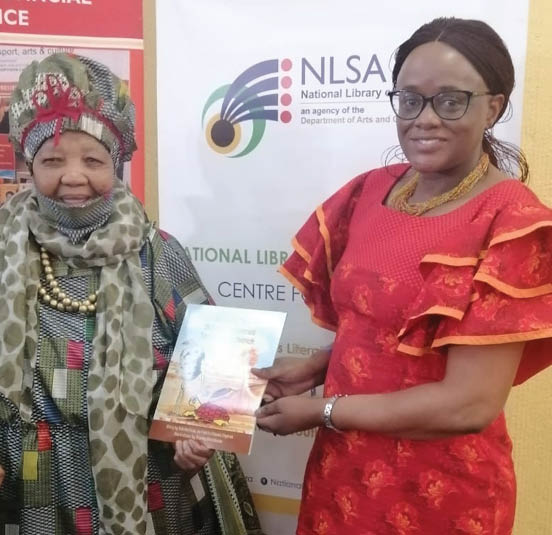
Katrina Esau (87), one of the last remaining South Africans who can speak the ancient San language N|uu , has penned a children’s book in her mother tongue titled ‘!Qhoi n|a Tjhoi’ (Tortoise and Ostrich/Skilpad en Volstruis).
The book is based on a folktale about an ostrich and a tortoise who come across a clay pot and decide to race for it. The tortoise wins.
Ouma Katrina, as she is fondly known, wrote the book with the help of her granddaughter Claudia Snyman, who also understands the language.
“Like most folktales, the story carries with it many meanings and meanders. It is more about friendship, strength, outwitting competition and how the tortoise got its shell.
“Folktales were and still are used to teach children about animals, nature and people,” says Ouma Katrina.
She has been a fierce culture activist in preserving the existence of N|uu. Ouma Katrina established language school ǂAqe ǁX¡¯oqe (Gaze at the Stars) in her backyard in Upington, Northern Cape, to preserve, promote and share her knowledge.
She has received many accolades for her efforts. Ouma Katrina’s community crowned her Queen of the Western Nǁnǂe (ǂKhomani) San in 2015. A year earlier, former President Jacob Zuma presented her with the National Order of the Baobab in Silver.
“The Khoisan were said to be illiterate by Dutch colonisers. I want to break this myth as our language is written in its own style and format, characterised by numerous distinct clicks which influenced Nguni languages, such as isiXhosa and isiZulu.
“Tortoise and Ostrich will hopefully chart a path to remembering South Africa’s and Africa’s authentic identity. I want to see the book create awareness of the N|uu language and help take it forward,” she said at the recent book launch, which was hosted by the National Library of South Africa.
The book will also be translated to Setswana, isiXhosa, isiZulu and Nama, the most spoken language in Namibia. The Department of Sport, Arts and Culture described the book as an “ideal platform for telling the richness of the South African story”.
The book can be bought online at www.puku.co.za
Prevent identity theft
Prevent identity theft BathandwaTo avoid becoming a victim of identity theft, it’s essential to immediately report a lost or stolen identity document or passport.
Mabitsela, from Modimolle in Limpopo, applied for a loan at a bank in November 2020, but was told he was over-indebted and didn’t qualify.
“I went to apply for a short-term loan as I needed to make ends meet after being retrenched in June 2020. To my surprise, I was told I did not qualify.
“I initially thought it was because of my unstable income, but it wasn’t. I knew I only had one clothing account and no other debt, so I asked for a printout of my profile,” he says.
Mabitsela saw that two cellphone contracts, a R65 000 bank loan and numerous retail shop  accounts had been opened in his name. The debt was close to R100 000.
accounts had been opened in his name. The debt was close to R100 000.
“Just before the national level 5 lockdown, I lost my ID book. I thought it was somewhere in the house and wasn’t too worried because I had my smart card ID,” he says.
After realising that someone was creating debt in his name, Mabitsela opened a case of stolen identity at the South African Police Service (SAPS).
He had to write an affidavit stating that he lost his identity book and take it to creditors with his case number to avoid being blacklisted.
Mabitsela’s experience is not unique. According to the South African Fraud Prevention Service’s (SAFPS) 2020 fraud report, last year fraud increased by 161% in the Eastern Cape and 120% in Gauteng.
Manie van Schalkwyk, the Executive Director of the SAFPS, says: “The most worrying is that impersonation fraud – otherwise known as identity fraud – has increased by an alarming 337%.”
Van Schalkwyk says people must report a lost or stolen ID book or passport immediately.
“Reporting the loss or theft to the SAFPS and the SAPS ensures that we are able to enter the details on our database and inform our members. They can then take additional care when confirming an identity.”
If your ID book or passport is lost or stolen, call SAFPS at 011 867 2234 or email protection@safps.org.za. You should also call the SAPS at 08600 10111 or visit your nearest police station.
Report elder abuse
Report elder abuse BathandwaThe Department of Social Development is training non-profit organisations to equip them to help the elderly.
Carrol Sello, a social worker at the Gauteng Department of Social Development, says there are various types of elder abuse.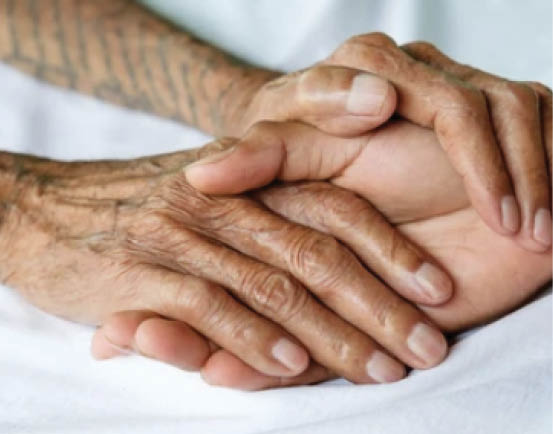
“Elder abuse varies. It is most commonly perpetrated through financial abuse, when the caregiver or those close to the victim take the elderly person’s assets without their consent.
“Other forms of elder abuse include emotional abuse, which goes hand-in-hand with financial abuse; and neglect, when they are not fed or given their medication timeously,” says Sello.
She explains that many elderly people are abused daily, in their own homes, and are not aware of their rights or that they can report their abuser and receive assistance.
Abuse of the elderly, like any other form of abuse, is illegal in South Africa. Section 10 of South Africa’s Constitution states that everyone has the right to have their dignity respected and protected. In addition, the Older Persons Act criminalises all forms of elderly abuse. Those found guilty can be fined or imprisoned.
When someone is convicted of abusing an elderly person, their details are entered into the National Register of Older Persons which is kept by the Department of Social Development (DSD). This means the abuser can never work at a place where they have access to older persons.
The DSD recently ran a training programme for non-profit organisations to prepare them to help older persons in their communities and prevent elder abuse.
Portia Mokoena, from Sharpeville Old Age Home, attended the training. “We are extremely grateful for this initiative that the department has created, as it can assist us to combat the problems the elderly are often faced with,” she says.
Sello urged anyone who suspects that an elderly person is being abused, not to get directly involved, but to rather go through the proper channels to ensure a concrete intervention.
“They must inform their closest social worker or report the matter to the police,” she says.
To report elder abuse, contact Crime Stop on 08600 10111.
SOEs must drive economic growth and transformation
SOEs must drive economic growth and transformation vuyelwanFor some years now, South Africa’s state-owned enterprises (SOEs) have mostly been associated in the public eye with state capture, financial mismanagement and inefficiency.
In addition to needing regular bailouts from government, some of the country’s biggest and most important state-owned companies have been struggling to meet their mandates.
These SOEs should be at the forefront of economic and social transformation. They are responsible for providing the infrastructure and the services on which the economy depends, whether it be in the generation of electricity, commuter transport, water provision, freight logistics or telecommunications.
Our approach to state ownership is informed by the need for the effective functioning of key network industries, such as energy and ports, and by the need to ensure that the basic needs of all South Africans, particularly the poor, can be met.
We firmly believe that public ownership is necessary in critical sectors of the economy and that the country needs robust SOEs that are able to drive economic growth and transformation.
This is particularly the case in the delivery of public goods such as electricity and water, where SOEs are able to pursue a developmental mandate in the public interest as opposed to a purely commercial one. 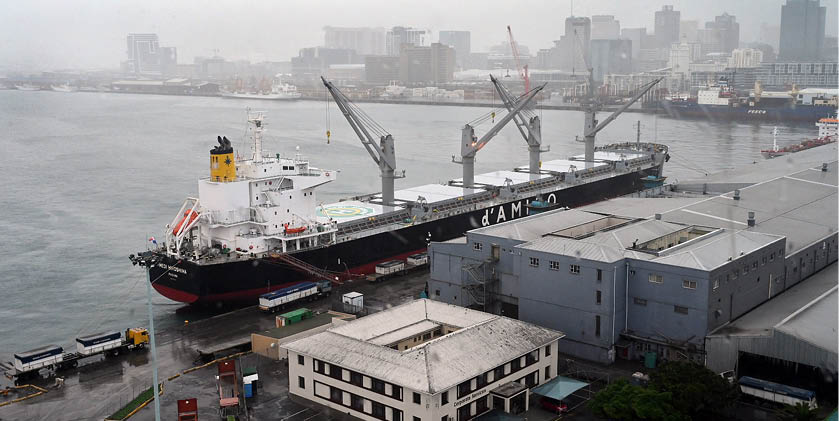
That is why we have made it a priority of this government to turn these companies around to root out corruption, improve their governance and enable them to play the role they should in driving economic growth and employment creation.
To this end, we have embarked upon a number of reforms to strengthen these SOEs so that they can produce the results that the country needs and expects.
One of the most important reforms is in the energy sector. We have begun the process of restructuring Eskom into three different SOEs, responsible for generation, transmission and distribution, respectively. This is because the previous structure of Eskom was ill-suited for a changing energy landscape. It had become inefficient and costly and was not sufficiently transparent.
The establishment of a transmission entity in particular will mean that Eskom will be able to purchase power from a broader range of providers, both private and public. This will improve transparency, increase competitiveness and promote the purchase of lowest-cost electricity.
Through the Renewable Energy Independent Power Producers Programme, there has been significant private investment in energy generation. With the proposal to raise the licencing exemption for embedded generation – where companies produce electricity for themselves and other commercial users – from 1MW to 100MW, we can expect even more private investment.
This is vital at a time when the country is suffering from severe and sustained electricity shortages and where neither Eskom nor the state is able to invest in new generation capacity.
Importantly, these reforms will give Eskom the space to address its financial and operational challenges.
Another critical reform is the establishment of the National Ports Authority as an independent subsidiary of Transnet.
This a crucial part of Transnet’s broader strategy to revitalise our logistics infrastructure. Transnet plans to invest R100 billion over the next five years in upgrading its infrastructure across the ports system. This will make our ports more efficient and our exports more competitive, and benefit the entire economy.
For the ordinary consumer, it will mean reduced prices in the long term for many of our goods. For our exporters, it will mean greater competitiveness in global markets.
As our exports grow, our economy will expand and create more jobs. More efficient ports will make the entire economy work better – and as port volumes increase, jobs will be created at the ports themselves.
Establishing the National Ports Authority as a Transnet subsidiary with its own board will, among other things, mean that revenues generated by the ports can be used to replace old equipment and upgrade and expand our ports, work which has been delayed for more than a decade.
Among other things, these reforms will encourage greater private investment in the country’s economic infrastructure. Some people have expressed concerns that this will diminish the importance or reduce the value of SOEs. In fact, the contrary is true.
These reforms will ensure that while strategic infrastructure remains firmly in state hands, our SOEs will become more efficient and the industries they support will become more competitive. Equally, these reforms are important to ensure that SOEs implement their broader developmental mandates to support all citizens and the economy.
Our policy remains that SOEs must play a crucial developmental role in supporting the growth of our economy. Our task is to place them on a sound footing, so that they can serve their ultimate shareholders – the South African people.
Teen skateboarder Boipelo off to the Olympics
Teen skateboarder Boipelo off to the Olympics UrsulaKimberley-born skateboarder Boipelo Awuah (15) has secured a place in the South African skateboarding Olympic team. 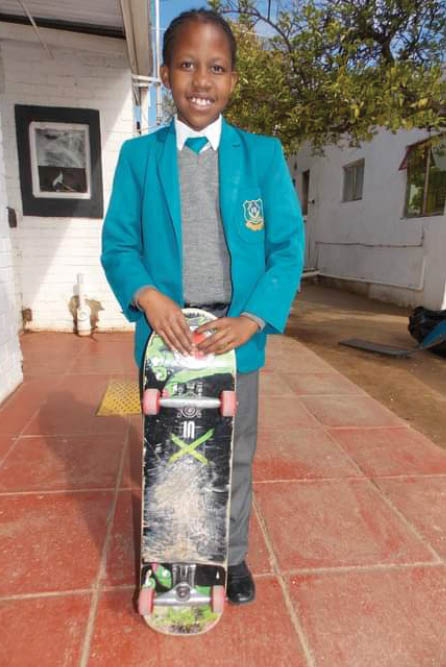
She will represent the country at the Olympic Games in Tokyo, Japan, which takes place from 23 July to 8 August.
The teen qualified for the Olympic Games via the World Skateboarding Championships held in Rome, Italy, in June.
Awuah, who took up the sport when she was five, says her love of skateboarding ensured that she was winning provincial and national competitions by the time she was nine.
She says being part of the Olympic team is a dream come true.
“I am very happy, but shocked as well. It is not easy to represent your country and the continent at the Olympic Games.
“Being just 15, I feel like this is big opportunity to pave the way for female skaters in our country, while showing the world that we also have the skills to participate at this level,” she says.
Awuah will be one of about 85 skateboarders who will make their first appearance at the Olympic Games, following a decision by the International Olympic Committee (IOC) to include the sport.
“I feel like I’m part of history in the making. It is a huge deal for the sport to be included in the Olympics. The fact that I am able to represent my country is a big compliment,” she says.
Awuah, a Grade 10 learner at Kimberley’s Northern Cape High School, says her school has enabled her to juggle her professional sporting career and her studies.
“The teachers and my peers have shown great support and are always willing to help. They also tell me how proud they are of me.”
Her father Baffour Awuah is beaming with pride.
“I am very excited and proud. Boipelo has shown great achievements and this is a first for the family© She has achieved this through passion,” he says.
President of Roller Sport South Africa Wendy Gila believes Awuah has a bright future ahead of her.
“With even harder training, she will definitely be a force to be reckoned with at the 2024 Olympic Games,” she says.
Think before sharing false vaccine stories
Think before sharing false vaccine stories vuyelwanPresident Cyril Ramaphosa has warned South Africans not to cause harm to others by spreading false stories about the Coronavirus Disease (COVID-19) vaccines.
“False stories are being spread on WhatsApp groups, on social media and by word of mouth about the COVID-19 vaccine, claiming that the vaccine is not safe, that it can make you sick or that it doesn’t work,” he noted.
The President called on South Africans to think about the consequences of spreading false information.
“Please consider the harm you may be causing. You are spreading panic, fear and confusion at a time when we can ill afford it.” 
He reassured South Africans that the scientific evidence shows that vaccines work.
“They are safe. They are effective and they save lives. If you have any questions about the vaccine, if you are unsure in any way, please consult the information being provided by the Department of Health and from doctors.”
South Africa has seen a rapid increase in COVID-19 cases recently, which is largely due to the presence of the Delta variant of the virus in the country.
This variant was first detected in India at the end of March this year and has since been found in 85 countries.
“The Delta variant has now been detected in five of our provinces, namely the Eastern Cape, Free State, Gauteng, KwaZulu-Natal and Western Cape.
“The evidence we have is that the Delta variant is rapidly displacing the Beta variant, which has been dominant in our country until now,” he said.
President Ramaphosa noted that many South Africans are questioning if the vaccines currently being used are effective in preventing severe illness or hospitalisation from the new variant.
“There is evidence that the vaccines we are using in South Africa are effective against the Delta variant.”
However, the President added that some who have been vaccinated could become infected, regardless of variant, because no vaccine is 100% effective.
“Where vaccinated people do get infected, the symptoms tend to be mild.
“The most important thing is that any of the vaccines we are rolling out will protect you against severe disease, hospitalisation and, most importantly, death,” said President Ramaphosa.
Turning youth into entrepreneurs
Turning youth into entrepreneurs BathandwaDanie Jacobs teaches children about financial literacy and entrepreneurship from a young age, as he believes this will reduce unemployment and poverty when they are adults.
Jacobs, who was concerned about how many children leave school ill-prepared for the working world, founded the Young Entrepreneurs (YE) Foundation to teach them entrepreneurial, financial literacy, employability and workplace readiness skills. 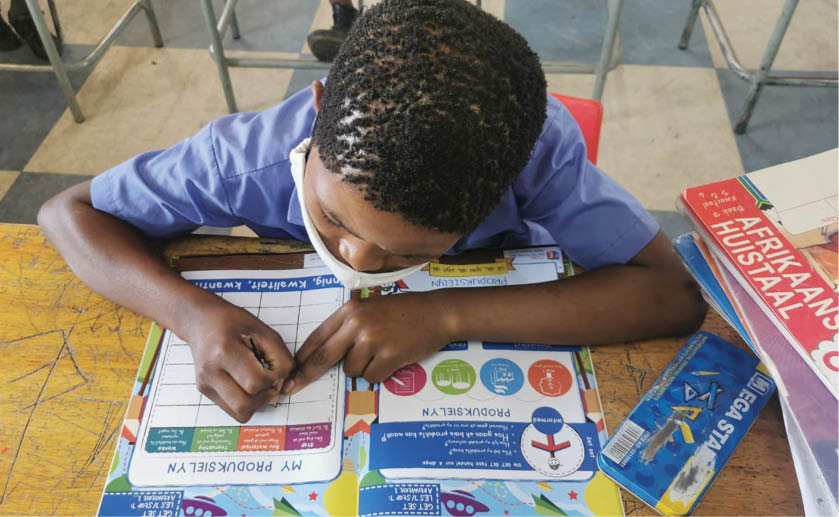
He believes the foundation will help children to start and grow micro enterprises and has taken his work to townships across South Africa.
“YE empowers children and young adults to become their own bosses, acquire a millionaire mindset and be equipped for the rapidly changing world of work.
“I truly believe that youth unemployment, poverty alleviation and major socio-
economic change can only be achieved if we establish an entrepreneurial culture in South Africa.
The foundation impacts around 6 500 kids annually.
“Our programmes enable children to discover money and business through play and a collection of fun, interactive, multi-media, minds-on and hands-on activities, games, simulations, videos and online applications,” says Jacobs.
The foundation initially experienced challenges with parents who believed their children would only succeed in life by obtaining a university qualification and getting a job.
“When the Coronavirus Disease came along, everyone saw how things changed. They realised how having an entrepreneurial mindset is important for the future,” says Jacobs.
The foundation is a partner of the Department of Basic Education’s (DBE) E3 Schools Programme, which transforms teaching and learning to develop learners who complete school prepared for entrepreneurship, employability and further education.
Henry Syce, the principal of Johnson Nqonqoza Senior Secondary School in the Eastern Cape, says the iniative is having a positive impact on the community.
“The YE empowers our learners with practical entrepreneurial skills and challenges them to think out of the box.”
Siphosethu Tonga, from Sommerset East in the Eastern Cape, is a youth facilitator of the programme. He is excited to see learners grasping the concepts he explains to them in their mother tongue.
“I found the content understandable and accessible... Children are being taught to work for themselves, create their own wealth and not be solely dependent on government for work,” he says.
Unite against human trafficking
Unite against human trafficking vuyelwanWorld Day Against Trafficking in Persons, which is commemorated on 30 July, raises awareness of human trafficking, its victims and the protection of their rights.
Trafficking in persons is a serious crime and a grave violation of human rights. It exploits women, children and men for various reasons, including forced labour and sex.
According to the United Nations’ (UN) Office on Drugs and Crime, almost every country in the world is affected by trafficking, with thousands of people falling victim to it every year.
This year’s theme for World Day Against Trafficking in Persons – ‘Victims voices lead the way’ – puts victims at the centre of the campaign and highlights the importance of listening to and learning from survivors.
Unite against trafficking
Minister of Social Development Lindiwe Zulu has called on South Africans to unite against trafficking.
“Many children in the country have been victims of different forms of abuse, including child trafficking, and government and South Africans have a collective responsibility to protect them. 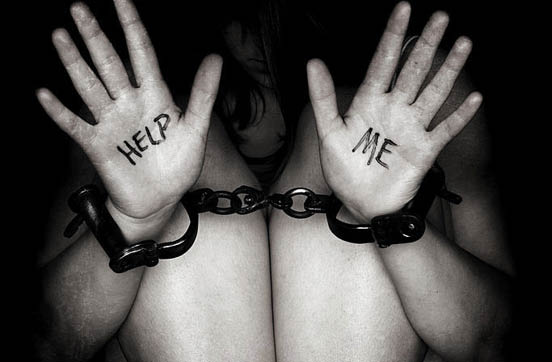
“According to the 2018 UN Office on Drugs and Crime’s Global Report on Trafficking in Persons, it is estimated that children comprise almost a third of all human trafficking victims worldwide,” the Minister says.
As part of efforts to combat trafficking, government promulgated the Prevention and Combating of Trafficking in Persons Act in 2013.
The Act provides for the prosecution of people who commit offences referred to in the Act, the prevention of trafficking and the protection of and assistance to victims, among others.
The Department of Social Development also provides support for victims of human trafficking. It places child trafficking victims in child and youth care centres, where they are assessed by social workers, medical experts, psychologists and other therapists to identify risks and develop an intervention plan.
“To prevent child trafficking, parents and caregivers are encouraged to monitor children’s behaviour, especially the use of cellphones and other gadgets, as traffickers also use technology to attract and groom their targets.
“In some instances, traffickers may pretend they are the same age as the child to draw them closer. It is important for parents to be vigilant and monitor who their children associate with,” the Minister says.
If you suspect human trafficking, contact the Gender-based Violence Command Centre toll-free at 0800 428 428 or request a social worker to contact you by dialling *120*7867# from any mobile phone. You can also call Crime Stop at 08600 10111.
Vaccine drive gathers pace
Vaccine drive gathers pace vuyelwanAs South Africa battles a third wave of the Coronavirus Disease (COVID-19), the country’s mass vaccination programme is expanding to include more categories of people.
South Africans between the ages of 50 and 59 are expected to start receiving vaccines from 15 July.
“The [vaccination] programme has picked up significant momentum, with key milestones being achieved as we move forward,” said President Cyril Ramaphosa.
The first phase of the vaccination programme focused on healthcare workers, while the second phase targeted the age group of 60 and above.
The national vaccination programme is now continuing along defined streams. 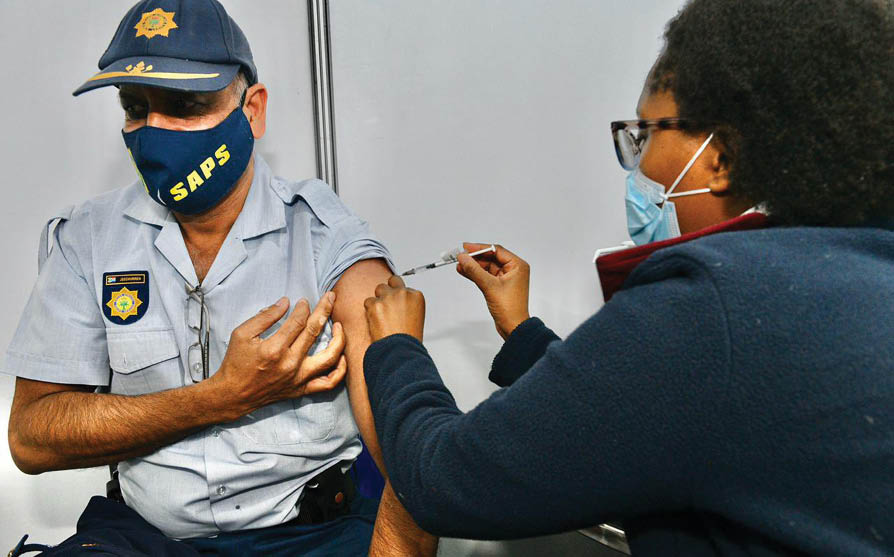
The first stream is the general population according to age groups. On 1 July, registration for vaccination on the Electronic Vaccination Data System (EVDS) opened to 50 to 59 year olds.
The second stream commenced with those working in the basic education sector, which includesteachers. They started receiving vaccines in June.
The third stream is focusing on police and other security personnel. Those who fall under this sector started receiving the vaccine at the beginning of July.
The fourth stream is through workplace programmes in key economic sectors, such as mining, manufacturing and the taxi industry.
Arrival of vaccines
The vaccination programme is expected to pick up pace with the arrival of more vaccines in the country.
Acting Health Minister Mmamoloko Kubayi-Ngubane said about 2.1 million doses of the Pfizer vaccine are expected to arrive in July.
Pfizer delivered nearly 4.5 million doses in quarter two and has committed to just over 15.5 million doses in quarter three.
“Johnson and Johnson has so far delivered 500 000 early access doses used for Sisonke, 300 000 market doses two weeks ago and 1.2 million doses, [which] landed recently. These doses all need to be used by 11 August.”
The country is also awaiting confirmation of a further of 500 000 doses, which expire on a later date than the other doses.
Red alert
While Gauteng remains the epicentre of the COVID-19 pandemic Minister Kubayi-Ngubane has warned that many provinces in the country are almost at red alert as infections continue to increase.
“The trends are clearly showing that other provinces which are currently lagging, are going to experience the trend we are seeing in Gauteng, most notably in the Western and Eastern Cape. What worries us as well, is the positivity rate. If you look at Limpopo, it has almost a 42% positivity rate, which is leading in terms of positivity rates.”
She said the COVID-19 situation in the country remains of great concern, as the numbers continue to increase at a rapid rate.
“We remain very worried about the rise in hospitalisations, which is putting a lot of strain on the health facilities in Gauteng.
“The private health hospitals are currently operating at more than 100% capacity and public health hospitals are edging closer to full capacity.”
Fighting the pandemic
President Ramaphosa has called on South Africans to take measures, to protect themselves, adding that the tried and tested public health measures, that are in place, are our best chance at fighting the pandemic.
“They are not complicated, difficult or expensive. Whatever inconvenience they may be to us, they are certainly better than becoming seriously ill and needing hospitalisation.
“We must always wear a mask in public. We must regularly wash or sanitise our hands. We must always keep a safe distance from others. Unless it is necessary, please remain at home,” stressed the President.
He added that South Africans are all responsible for not only their health, but also the health of those around them.
“We must all be worried about what we are seeing unfold before our very eyes. Every one of us has a friend, a family member or a colleague who has been infected.
“There are few in our country who have not had to bury a family member, a friend or a loved one who lost their lives to this disease.”
President Ramaphosa said while the pandemic may seem overwhelming, South Africans can do something about it by making the right choices to safeguard their lives and those of others.
Your guide to applying for a govt job
Your guide to applying for a govt job UrsulaThere are specific requirements that need to be met when applying for a vacancy in government. 
To empower the youth with the necessary knowledge about these requirements, Government Communication and Information System (GCIS), in partnership with the Department of Public Service and Administration (DPSA), recently held a webinar on ‘How to apply for a government job’.
The webinar was part of the Vuk Talks initiative, which is a series of free webinars aimed at assisting the youth.
David Jacobs, Chief Director of Cluster Supervision at GCIS, explained that the webinars are modelled along the lines of the internationally known Ted Talks series.
“But Vuk Talks is different as it’s about the ‘how to’. The webinars share educational content and real skills with the youth, so that they can improve their lives,” said Jacobs.
He added that Vuk Talks is an ongoing programme with many more webinars in the pipeline to empower the youth.
Dos and don’ts
The aim of the ‘How to apply for a government job’ webinar was to make information about public sector vacancies more accessible and inform the youth about the dos and don’ts when applying for a job in the public service.
Renel Singh-Dastaghir, the Director for Employment Management at the DPSA, said that those seeking public sector employment can search for vacancies on a number of platforms, including Public Sector Vacancy Circulars which are posted every Friday on the DPSA’s website (www.dpsa.gov.za). Most vacancies are also loaded onto GCIS’s website (www.gcis.gov.za); government’s website (www.gov.za); individual government departments’ websites, in vacancy portals; and are advertised in the media.
Singh-Dastaghir gave a live tutorial of the DPSA’s website and showed participants where to access the weekly Public Sector Vacancy Circulars. You can do this by following these steps:
- Go to the DPSA’s website (www.dpsa.gov.za).
- Click the red button at the top that says ‘DPSA to Gov communication’. Click ‘Public service vacancies’ on the left of your screen.This will open the latest circular.
Information for applicants
The vacancy page also contains detailed information, above the circular, for applicants.
It states:
- Applications must be submitted on form Z83, with full particulars of the applicant’s training, qualifications, competencies, knowledge and experience (on a separate sheet if necessary, or a CV). This must be forwarded to the department in which the vacancy exists.
- Applicants must indicate the reference number of the vacancy in their application.
- Applicants requiring additional information regarding an advertised post must direct their enquiries to the department where the vacancy exists.
- Applications must reach the relevant department on or before the closing date.
Vacancies are listed under the relevant national or provincial department in the circular. Applicants must click on the relevant link to view each vacancy.
New Z83 form
Singh-Dastaghir said a new Z83 application form was gazetted on 1 January 2021.
“If your application is not submitted on the new Z83 form, it will not be accepted and you will be disqualified,” she explained.
Singh-Dastaghir said public service departments are governed by the Public Service Act, which means that anyone who applies for a Public Service Act post is required to complete the Z83 application form.
A new, editable Z83 form is also located on the vacancy page, to make the application process easier.
“Applicants can enter their details electronically and then print the completed form. Once printed, they must sign it and include it with their application,” she said.
Senior posts
Applications for senior public sector posts will have additional application requirements, including a pre-entry certificate course that must be completed prior to your appointment.
The course enables applicants to better understand the public service environment, including its structures and strategic and governance processes.
Every vacancy post contains a ‘note’ to candidates.
“It’s important that candidates read this note as it will contain specific information about the advertised post and its requirements. Failure to comply will result in your application being disqualified,” said Singh- Dastaghir.
To watch the full webinar, visit Vuk’uzenzele’s Facebook page at www.facebook.com/VukuzenzeleNews, find the post on the webinar and follow the instructions.